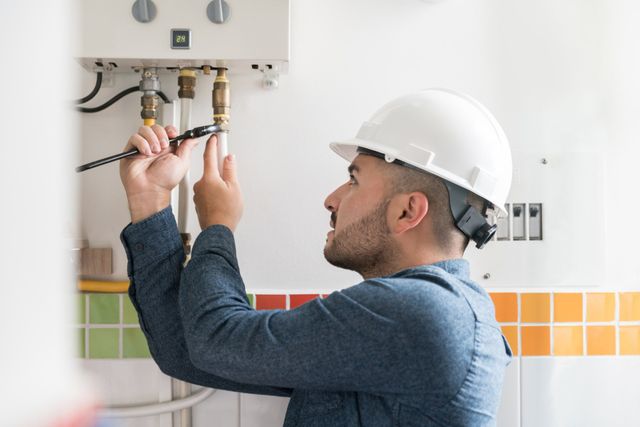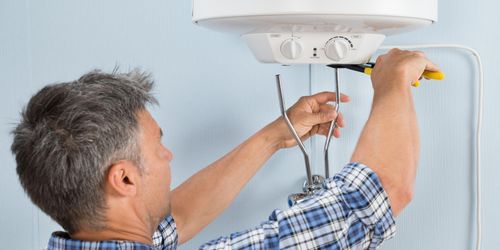Handling the Typical Water Heater Crisis Scenarios
Handling the Typical Water Heater Crisis Scenarios
Blog Article
What're your opinions with regards to Common Hot Water Heater Problems?

A water heater is one of one of the most essential standard appliances that can be discovered in a residence. With water heaters, you do not need to undergo the stress and anxiety of heating water manually whenever there is a need to wash, wash, or the dishes. Nevertheless, there is constantly an opportunity that your water heater would break down similar to the majority of mechanical devices.
It is essential to keep in mind any type of little malfunction as well as tackle it promptly before points leave hand. Most times, your water heater begins to malfunction when there is a build-up of debris as a result of continual usage. As a safety measure, periodic flushing of your hot water heater is recommended to avoid sediment accumulation and avoid useful failing.
Usual hot water heater emergency situations as well as just how to handle them
Too little warm water
Taking care of a not enough supply of hot water can be discouraging. It might be that the hot water heater can not support the hot water demand for your apartment. To deal with this issue, you might attempt to readjust your heater's temperature level dial and also wait on a few mins. You can ask for the help of a specialist plumber if the issue lingers. Additionally, you might upgrade your water heater to one with a bigger capacity.
Fluctuating water temperature level.
Your water heating unit can start creating water of various temperatures usually ice cool or hot hot. There might be a need to replace either the home heating or the thermostat device of your water heating system.
Dripping hot water heater tank.
A leaking storage tank could be an indication of corrosion. It could cause damage to the flooring, wall and also electric devices around it. You could even go to risk of having your apartment or condo flooded. In this scenario, you need to switch off your hot water heater, permit it to cool down, as well as thoroughly seek the resource of the problem. At times, all you require to do is to tighten up a few screws or pipeline links in cases of small leaks. If this does not work and also the leakage persists, you might require to utilize the solutions of a specialist for an appropriate substitute.
Stained or stinky water
You require to know if the issue is from the water or the tank resource when this happens. You are particular that it is your water heating unit that is faulty if there is no amusing smell when you run chilly water. The odiferous water can be brought on by corrosion or the buildup of bacteria or sediments in the water heater container. Once you observe this, you can try flushing out your container or changing the anode if the issue continues. The feature of the anode is to clean germs from your container. Because the anode pole substitute requires a detailed understanding of your water heating unit, you will need the aid of an expert.
Verdict
Some house owners ignore little caution and minor faults in their water heater system. This only leads to additional damages as well as a possible complete failure of your home appliance. You must deal with your water heater faults as soon as they come near prevent more expenses and unneeded emergency problems.
With water heating units, you do not require to go through the stress of heating water by hand every time there is a demand to take a bath, do the washing, or the dishes. It may be that the water heating unit can't support the warm water need for your home. Your water heating system could begin generating water of different temperature levels usually ice scalding or cold warm. If there is no amusing odor when you run chilly water, then you are particular that it is your water heating system that is malfunctioning. The stinky water can be caused by corrosion or the accumulation of microorganisms or debris in the water heater tank.
Water Heater Burst: Why This Happens And What To Do Next
Water Heater Explosion Warning Signs
Since storage water heaters are made of metal and store large volumes of heated water, they carry an increased risk of leaking or even exploding as they begin to rust at the fittings and seams over time. If the thermostat controlling the water temperature within the tank is faulty, or if mineral buildup inside the water heater prevents the thermostat from sensing the water’s temperature correctly, the water could become overheated. This will expand its volume within the tank, causing it to press at the tank’s fittings and seams. If these fittings and seams are rusted or corroded, the pressure could result in a leak or even an explosion.
Here are some risk factors and warning signs of an increased risk of water heater leak or explosion:
Your water heater is more than 10 years old. Your water heater makes clanking, banging or rumbling noises as it heats up, indicating that sediment has built up and hardened inside the tank. There is visible rust on the outside of the water heater, especially located at the pipe fittings or the seams that run down the tank. There is rusty water coming from your water heater, indicating that there may be rust building up inside. Your water heater is leaking, which could indicate either a crack somewhere in the tank or a malfunctioning temperature-and-pressure (T&P) relief valve. What To Do When Water Heater Leaks
If you find water dripping or seeping out of your water heater, or pooling around it, it means your water heater is leaking. If you find a leak, it may be best to call a plumbing professional to diagnose the problem and determine how best to handle it. If you choose to tackle it on your own, there are a few things you can do.
TURN OFF THE POWER
Next, shut off the power to the hot water tank at your home’s electrical breaker box. If you don’t shut off the power, the heating elements within the tank could continue to stay hot, which could pose a fire risk.
If you have a gas-powered water heater, you’ll also need to shut off the gas line leading into the tank.
FIND THE LEAK
Now it’s time to determine where the leak is coming from. Likely locations are the T&P valve, the drain valve or one of the pipes or fittings that feed into the top of the tank. If you see any rust or corrosion on the outside of your water heater’s tank, pipes or fittings, these could also be the source of the leak.
REPAIR THE LEAK
Once you determine the source of your water heater leak, you’ll have a better idea of what steps you need to take to fix the problem. It may be a simple fix—such as using a wrench to tighten fittings or replacing the T&P valve—but it may be something more complicated. You may even need to drain the tank, remove the water heater and install a new one.
https://www.abchomeandcommercial.com/blog/water-heater-burst/

I was shown that write-up on Is Your Water Heater Leaking? through someone on a different web blog. Kindly set aside a second to promote this write-up if you appreciated it. Thank-you for going through it.
Urgent plumbing? Call. Report this page